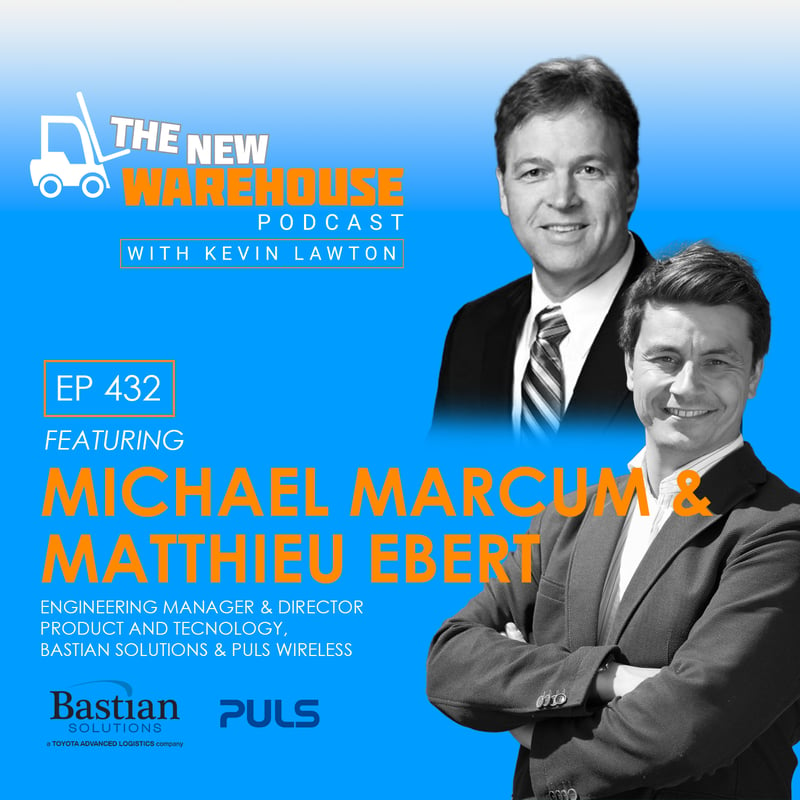
Episode 432: Wireless charging solutions in warehousing with Bastian Solutions and PULS
In the latest episode of The New Warehouse Podcast, Michael Marcum, the General Manager at Bastian Solutions, and Matthieu Ebert, the Director of Product and Technology at PULS Wireless, join the show to discuss the future of wireless charging in warehousing, power management, and automation. Bastian Solutions specializes in providing advanced logistics in material handling, such as automatic storage and retrieval systems and conveyor systems. PULS is a market leader in industrial DIN Rail power supplies. With the acquisition of Wiferion’s industrial charging business, PULS aims to expand its footprint to include mobile energy supplies.
The conversation takes several fascinating turns as both guests discuss their experiences with mergers and acquisitions and how these corporate changes have set the stage for innovation. What is driving the demand for autonomous vehicles in manufacturing and warehousing? What are the challenges that slow down the adoption of AGVs in warehouses? Stay tuned as Michael and Matthieu provide deep insights into these burning questions.
Challenges in Adoption of AGVs in Warehouses
Introducing AGVs into a warehouse environment is not without its challenges. Let’s examine some of these challenges briefly:
- Lack of On-Site Maintenance – Unlike manufacturing setups, which often have robust maintenance teams, many warehouses rely on external services for equipment maintenance.
- Infrastructure Readiness – Warehouses may lack the necessary infrastructure to support AGVs, especially when compared to manufacturing environments.
- Safety Concerns – AGVs require robust safety measures to prevent accidents, which can be challenging to implement in a warehouse setting.
- Power Management – Traditional power solutions can have issues of wear and tear and may not offer the robustness required for seamless AGV operation.
- Skill Gap – The technical skill required to manage and maintain AGVs may not be readily available within the warehouse staff.
Understanding these challenges is crucial for businesses considering the adoption of AGVs in their warehouses, as it informs the preparation and planning needed for successful implementation.
According to Matthieu, the value proposition of wireless charging stations for warehouse environments is multi-faceted and significant. He outlines these advantages in a detailed conversation reflecting the challenges and opportunities in the current logistics landscape.
The Case for Wireless Charging Solutions in Warehousing
Matthieu emphasizes that his company’s wireless charging solutions are essentially “plug-and-play kits” that automate power management. “The problem with customers is that they don’t value some robust or fancy charging or power management technologies,” he explains. This is crucial because it allows AMR manufacturers to focus on their core value propositions, like smart navigation and complex load handling, instead of grappling with power management issues. In essence, these wireless charging systems streamline operations, allowing manufacturers to concentrate on optimizing performance areas that directly affect the bottom line.
Matthieu’s second key point concerns the “necessity to design robust solutions.” He observes that many AMR builders begin with prototypes and then scale up but often overlook the limitations of their charging systems until they become problematic at higher volumes. By adopting robust, wireless charging solutions from the get-go, companies can sidestep these pitfalls. “A robust charging technology is not recognized on a small scale. It is recognized on large scale,” he says. This aspect is essential as AMRs are adopted in traditionally low-tech industries like warehousing, which may not have the expertise to manage complex systems.
Integrating Wireless Charging Solutions in Warehouses
Michael explains, “You do need to plan… it’s just design work, but you do need to do that design work upfront.” He further emphasizes the necessity of compatibility between the charger and the existing energy storage solutions, asking, “Whose battery do you have on your vehicle?” Matthieu also touches on this, highlighting the complexities of retrofits and stating, “I think there would even be the chance for a good ROI… the Brownfield business needs to be assessed case by case.”
While it’s clear that integrating new technology comes with its challenges, both experts agree that the work is necessary and rewarding. Matthieu aptly refers to it as “the homeworks of the OEMs,” and suggests that as long as the “pain, or let’s say the cost in operations is high enough, they will invest in doing the retrofit.”
Key Takeaways
- Wireless charging solutions offer “plug-and-play” convenience, allowing warehouses to focus on core operational efficiencies rather than power management.
- Implementing robust, scalable wireless charging technologies from the outset can help companies avoid issues as they scale up their automation efforts.
- Despite the challenges of integrating new technologies, both experts agree that the investment is worthwhile for significant operational improvements and potential ROI.
EP 432: Wireless Charging Solutions in Warehousing with Bastian Solutions and PULS









